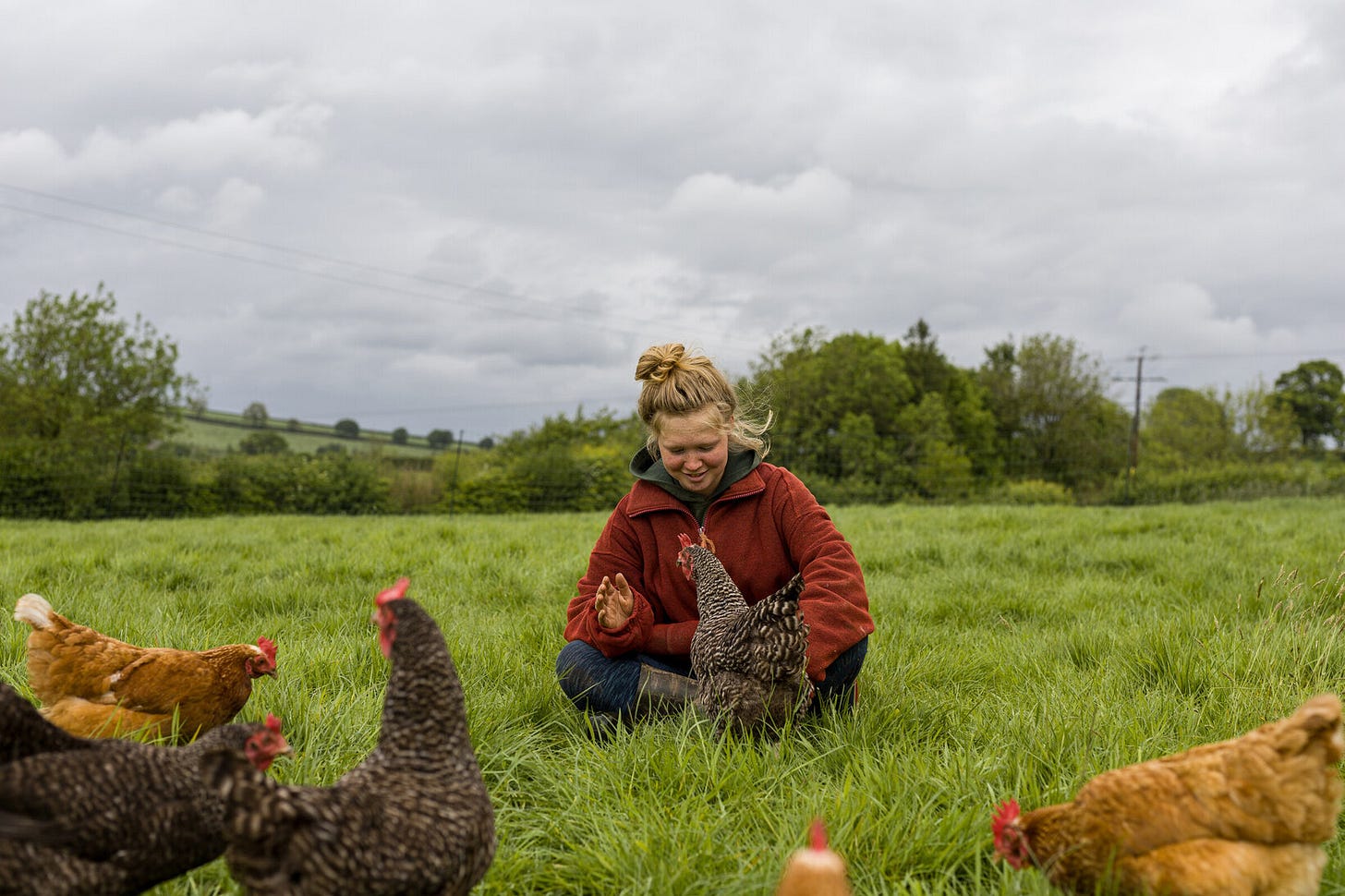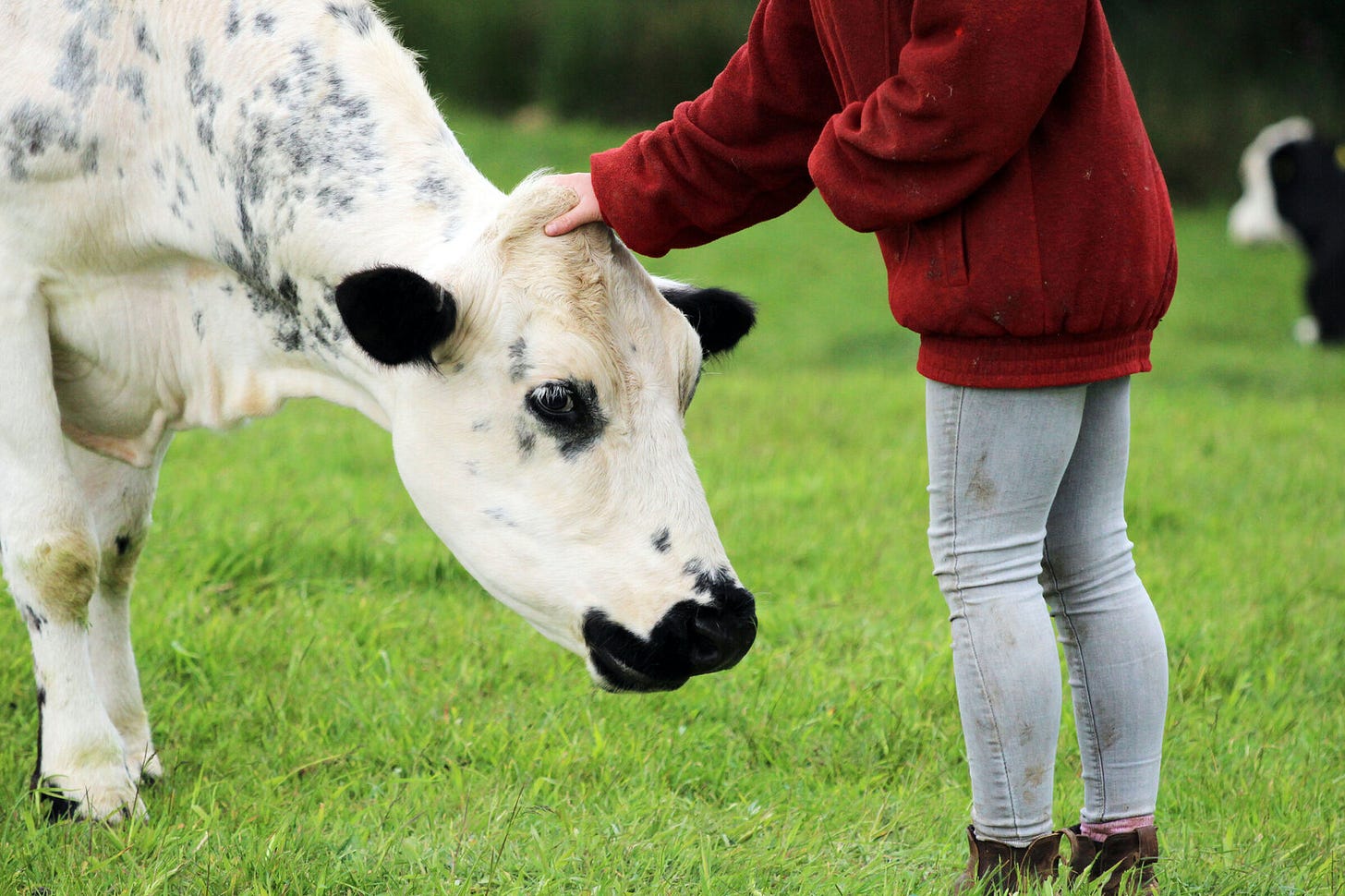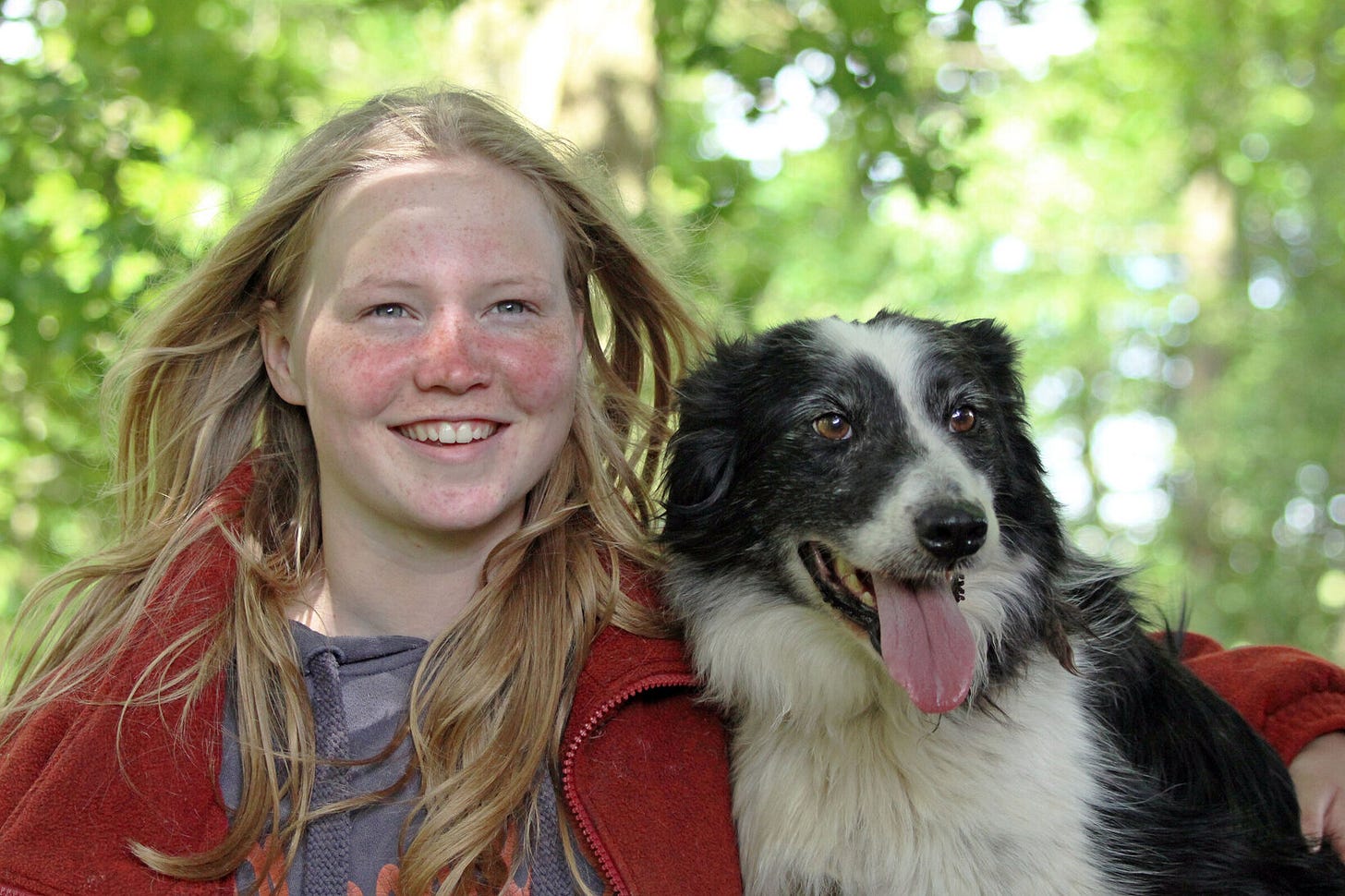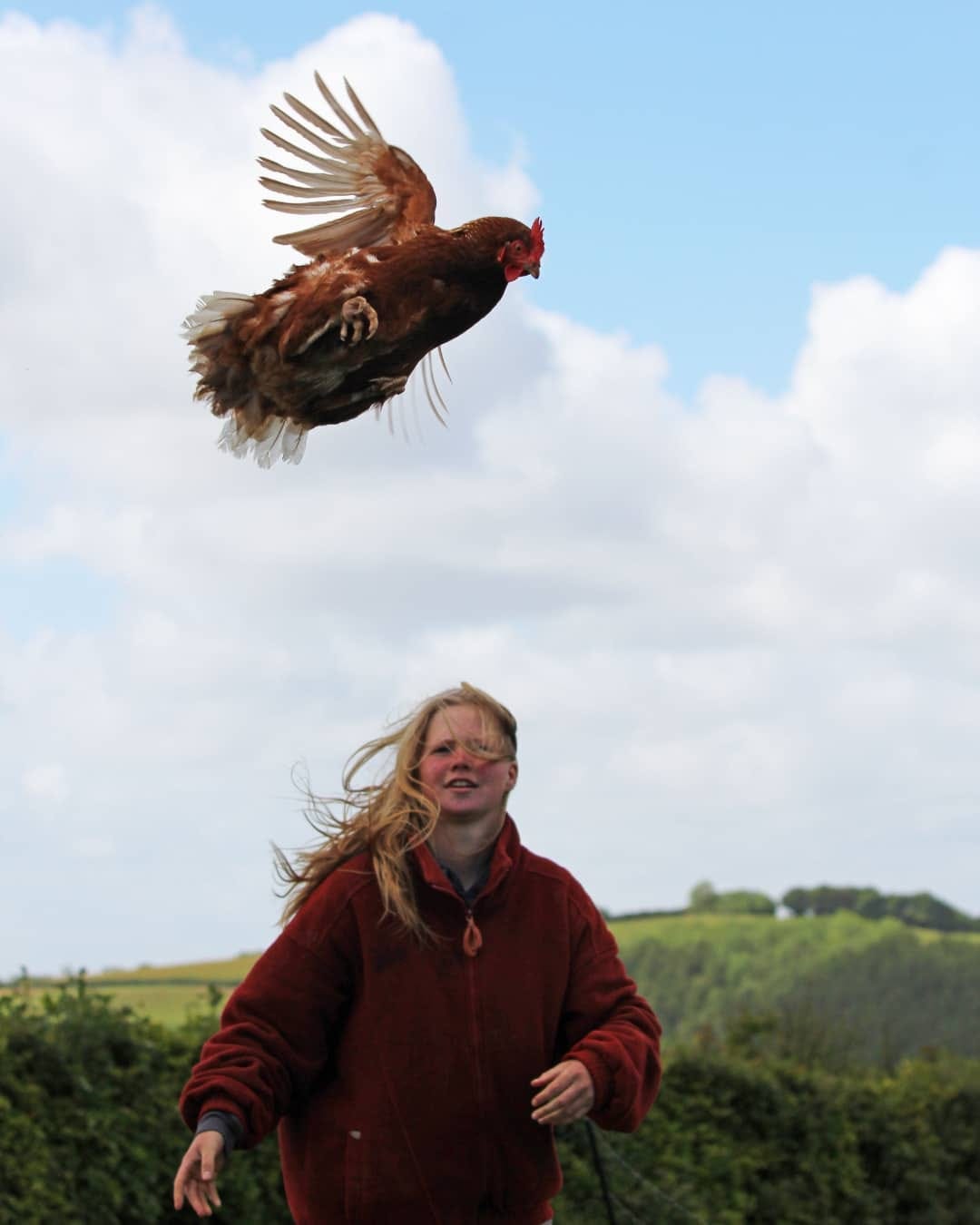“We need to restore land in a way that's healthier for us, the environment, our communities”
Redwoods Farm’s Amy Chapple on the (not so?) lonely job of farming, regenerative fibs, and difficulty relating to non-farmers
Amy Chapple started up her own farming business not long after leaving school; has advised Westminster on the dangers of soy as an animal feed (more on that another time); has spoken as an advocate for regenerative farming at Groundswell, London Climate Action Week, and on Countryfile. And she’s only in her mid-20s.
More to the point, Amy is among a small but growing cohort giving the farming industry a much-needed airing out. Similar in age and approach to previous WFJ interviewee Matteo Grasso, both are revealing how entrenched in its ways farming has otherwise become (the average age of the UK farmer at 59 will give you some idea as to why), and the precariousness of its general reliance on things like agrochemicals, routine antibiotic use, deforestation, and so on.
Eschewing such methods, Amy practices regenerative agriculture (or ‘regen ag’), which aims to increase biodiversity and carbon capture, reduce chemical inputs and fossil fuel dependency, and produce better-tasting food along the way.
Although Amy’s farm – Redwoods – is on parcels of land lent out by her parents based just the other side of the Somerset boundary in Devon, much of her influence extends into Somerset: Some of the farms’ sheep are grazed this side of the border, she sells plenty of chicken, beef, pork, and lamb here, and you’ll find her pretty much without fail (alongside her gran Sylvia) on the SFM section of The Frome Independent Market every month.
That in mind, Amy’s perspective has been noticeably absent from the contents of this newsletter. Until now: After mulling the latest addition to the farm – Phoenix, a disarmingly adorable Maremma sheepdog puppy brought in to protect Amy’s lambs and chickens from Mr. Fox (to whom Amy says the farm lost “between 40 and 50 hens” in the last 12 months) – the following exchange with Amy is pretty close to verbatim, but edited for clarity and brevity.
Hugh: You probably get this question a lot, but what does it actually mean to be a young farmer? I’m also thinking of young farmers clubs, but do we still need to encourage new people into farming of that age?
Amy: There are people who want to be in farming but can't get in because they were told by their parents, like I was, that the farms aren't big enough for them, or there's just no way in.1 Most young farmers who were born on a farm will go and work somewhere else for 20 or 30 years before they can take over their farm. So it's quite a weird industry and it's why the whole tax thing is such a hot topic within farming.
But yes, there's a guy [Dan Grist] who was the chairman of Devon Young Farmers and he does podcasting and is now really interested in regenerative agriculture. I saw him at Groundswell and we were having a discussion about how farmers and young farmers get into regen ag. There's a lot of people in conventional farming and there are some young farmers in regen ag, but generally young farmers clubs are a whole different world – a lot of them aren’t even farmers.
Hugh: So that thing about young farmers being of a conventional mindset. Why is that? I mean, are there any efforts to introduce alternative or progressive ways of farming such as regenerative to people in those groups?
Amy: I used to be involved in young farmers, and I’m being stereotypical here, but a lot about young farmers is about partying, while people in regen ag tend to be entrepreneurial and nature-minded and not really ‘going out’ minded. A typical young farmer works 12-plus hours a day, then goes out for the weekend and then does it all over again, if you see what I mean.
Hugh: I suppose from the outside looking in, I've come across studies by the Land Workers Alliance that say while there is the problem of getting new people or young people into farming, that's partly because they don't want to get into conventional farming. They are totally against the idea of farming to further ruin the planet, but there just aren't that many opportunities otherwise.
Amy: People who want to get into farming say it's very difficult because there's not a lot of opportunities, but at the same time it's really difficult to connect people. I'm looking for someone to do part-time work, but it's difficult to find someone who has the same sort of mindset as what I want. So it's a weird [situation]. Maybe it’s because farming is out in the middle of nowhere?
Hugh: That life that you've chosen – it's not a normal one. And I was wondering whether you might've thought that you've missed out on a lot of normal things that people in their mid-20s are up to, or perhaps you are quite happy that you have missed out on them?
Amy: It is weird meeting friends who aren't in farming sometimes because if you are late because a pig's got out, they don't understand it. They don't get that farming is a way of life as well as a job. It's just really odd hearing people talk about their day and then be like, oh, that's so different to what I'm doing. I guess I wouldn't change farming for anything else. I mean, I honestly don’t know how I would cope in a completely different job.
Hugh: Do you feel there's enough of a social element within it? I mean obviously there's that whole thing about the loneliness epidemic within farming, but more generally as well.
Amy: I did go through a phase of feeling quite isolated. I’m part of this thing called the Emergent Generation, which is for young people in the regen world, whether they are chefs or vets or farmers. So that really helps. But over time, going to places like Groundswell and conference type things in Bristol or Exeter, you meet people. I was talking to a friend the other day about it and they found it odd that I was friends with people in their 30s, 40s, and older. Maybe it's a farming thing?
Hugh: I wonder if it's a rural thing generally, because I grew up in rurality, but then I was in London for a bit and came to Somerset and suddenly realised everyone around me was not in their late twenties but maybe 50-plus. I thought, oh shit, I'm not going to make any friends around here. But that changed very quickly.
Amy: Exactly. You just kind of get on with different people and over time. I've found plenty of people local to me in rural Devon have a similar mindset.
Hugh: I was actually thinking, at least from my perspective, there doesn't seem to be too many regenerative farmers doing things the way you are – the whole Old MacDonald's Farm of pigs, chickens, sheep, cows – in your neck of the woods. How long have you been farming that way?
Amy: The sheep became fully pastured over ten years ago, but we went down the regenerative route six years ago. It was conventional before that, so a fair bit of set stocking,2 a bit of spraying off of weeds, fertiliser, and then feeding sheep and cattle supplementary things other than grass.
Hugh: And what, in a nutshell, does regenerative mean to you?
Amy: It's basically believing that ‘sustainable’ isn't enough and that we need to restore the land back to its full potential.
Hugh: Its ‘full potential’ – does that mean productive-wise?
Amy: I did a holistic management course before going into farming, which was very eye-opening because it makes you think of things as a whole. So full potential to me means obviously productivity, but also diversity – your livestock are healthier, the wildlife is healthier, the people you're feeding are healthier, we’d have a healthier environment, healthier communities. Just the whole thing.
Hugh: Do you think the regen ag thing is being co-opted to a degree?
Amy: Some people are using one or two of the five main regenerative principles, and they're like, “we are regenerative.” And I’m like, “I'm not so sure.” There's people I know who are then calling it agroecological farming, but the thing is every term you use could be [appropriated].
Hugh: That's the trouble isn't it? Before things get regulated the same way as perhaps organic does, there isn't much we can do about it.
Amy: They aren’t perfect either. The trouble with the regulations for organic is, there's a lot of people I know who are farming in every way that could be classed as organic, but they're a smallholding that can't afford the organic price.
Hugh: Price for accreditation, yeah.
Amy: There’s a lot of time to put into getting the accreditation which, if you are doing the whole thing of selling directly to customers with packing orders and so on, you don't have.
Hugh: Is that why you’re not organic?
Amy: We haven't gone for organic specification because our animals graze on other people's land, which means that we cannot bring them back onto organic land and call them organic. The other reason is that we've gone for local soy-free pig and hen feed over organic because it's so hard to source local organic feed.
Hugh: Some farmers, like you perhaps, are farming way above the organic standard, so it's almost as if they did stick an organic label on their products, they'd be doing themselves a disservice because it isn't as good as the standards that they're actually operating at.
Amy: It's hard to know, isn’t it. I mean, I do come across a lot of people who only buy organic because they know they can trust it, which I completely get.
Hugh: It is primarily for consumers who are short on time, I think. Generally people who just want that quick signal that says, “Hey, this is cool, you can buy this, it's fine.”
Amy: Then again, organic can be seen as an exclusive club for both farmers and customers because it's more expensive.
Hugh: I'm starting to come around to this idea that actually organic food, or that kind of standard of food, is so much more nutritionally dense that you actually don't need to eat as much of it.
Amy: Oh, I completely agree with that.
Hugh: And so in a roundabout way, cheap food is actually quite expensive in the sense that you end up buying more of it to try and make up for its nutrient deficiencies.
Amy: Even fast food places are now quite expensive. I think that they [Defra, or someone] should start paying farmers based on nutritional density. Actually, that would probably be a really good way of getting around the problem.
Hugh: If they can find a solid, well-tested way of measuring the nutritional content of something, yeah – that would be nice, wouldn’t it?
Amy is currently farming on bits of land within her parents’ patch. “I had to be a bit inventive with what I could do”






